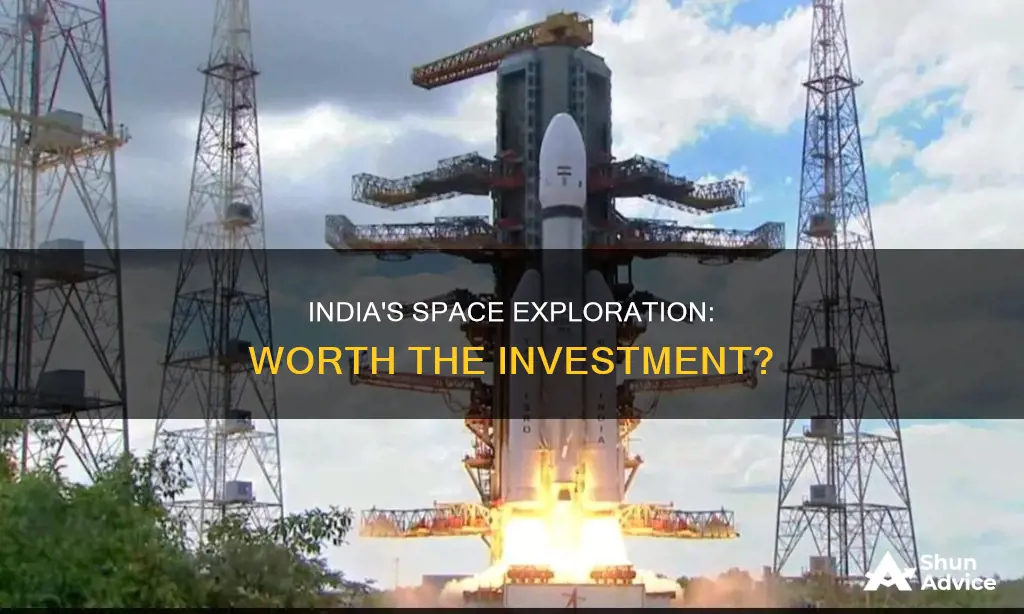
India's space exploration programme has been the subject of much debate, with some arguing that it is a waste of money and others seeing it as a massive investment. India's space programme was launched in the 1960s with the aim of advancing its social and economic development goals. In recent years, the programme has shifted towards ambitious space exploration and the use of space for national security, with a particular focus on China's growing counter-space capabilities. This has led to India's first human space mission, as well as missions to the Moon and Mars. While some argue that India should focus on addressing issues such as poverty, education, and health, others believe that space exploration is a logical next step for the country's maturing space programme and will bring technological breakthroughs and enhance India's reputation globally.
What You'll Learn

India's space exploration is a waste of money
There are also concerns about the cost of these missions, with critics arguing that the money could be better spent on addressing the basic needs of its citizens, such as poverty, education, health, and sanitation. It is argued that the development of human resources and the socio-economic condition of the nation should take priority over space exploration.
Furthermore, while India's space programme may have been driven by moral and sovereignty concerns in the past, it is now driven by pragmatism and concerns about national security. This shift in focus has led to the development of various military satellites for intelligence, surveillance, reconnaissance, and Earth observation. This has raised concerns that the programme is contributing to an arms race in space, rather than being a force for peace and development.
Additionally, there are those who argue that space exploration is not a natural progression for India's space programme. Instead, they argue that the country should focus on developing its satellite capabilities for mapping, surveying, and bringing telecommunication to remote rural areas. This was the original goal of ISRO's founder, Vikram Sarabhai, who stated that a developing nation like India would need to focus on applying advanced technologies to real problems facing its people and society.
In conclusion, India's space exploration is a waste of money and resources that could be better utilised in addressing the country's pressing issues and improving the lives of its citizens. Space exploration is a luxury that India cannot afford at this time, and it is not in line with the original goals and intentions of its space programme.
Choosing an Investment Portfolio: Strategies for Success
You may want to see also

Space exploration is a logical next step for India
The Indian Space Research Organisation (ISRO) has been working on Gaganyaan, the country's first human space mission, scheduled for 2023. India's space ambitions are also reflected in its missions to the Moon and Mars. While these missions have been questioned on the grounds that India still faces enormous developmental challenges, they are a logical progression of the country's growing space capabilities.
Firstly, space exploration is the natural progression of India's maturing space programme. With larger launchers and more complex operations, further space exploration to gain greater technological competencies is a logical step. Secondly, while these missions may not have a direct social or developmental impact, they increase the visibility and profile of the Indian space programme, making it a more attractive partner for collaboration. These missions also demonstrate India's ability to undertake complex projects with limited budgets, enhancing the attractiveness of its space launch facilities and indirectly benefiting the programme's revenue stream and soft power value.
Thirdly, these missions have resulted in spin-off technological breakthroughs. For instance, India's deep space communication capabilities are believed to have improved due to these missions. India's first Moon mission and the Mangalyaan mission for deep space communication functions were assisted by NASA. These missions and developments are important for India to gain a louder voice in the global governance of outer space.
In conclusion, space exploration is a logical next step for India as it continues to develop its space capabilities and seeks to gain greater technological advancements, enhance its reputation, and secure a prominent role in the global governance of space.
SIP Investment: A Smart Way to Invest in India
You may want to see also

Spin-off technological breakthroughs
Space exploration has resulted in several spin-off technological breakthroughs for India. Firstly, India's deep space communication capabilities have improved due to its missions to the Moon and Mars. The Indian Space Research Organisation (ISRO) has also been working on Gaganyaan, the country's first human space mission, scheduled for 2023. These missions have enhanced India's technical capabilities and increased the visibility and profile of its space programme, making it a more attractive partner for collaboration.
Secondly, ISRO's engineering capabilities have been demonstrated through the successful deployment of a large number of satellites into orbit. In 2014, ISRO launched 37 satellites on a single rocket, breaking the previous record. In February 2023, it launched a remarkable 104 satellites into orbit, with precise trajectories and choreography, showcasing its savvy engineering and organisational efficiency.
Thirdly, ISRO has also been at the forefront of developing small, inexpensive satellites, which are becoming increasingly popular. These satellites have a wide range of applications, including imaging, mapping, and telecommunication. ISRO's ability to offer relatively low-cost satellite launches has made it a competitive player in the global space economy, attracting customers from various countries.
Finally, ISRO's successful missions have resulted in technological advancements with broader implications. For example, the Mars Orbiter Mission (MOM), also known as the Mangalyaan mission, was a technology demonstration that cost a fraction of similar missions by other space agencies. This organisational efficiency and cost-effectiveness are hallmarks of ISRO's approach, and they have the potential to revolutionise space exploration, making it more accessible and affordable.
In conclusion, India's investment in space exploration has yielded significant spin-off technological breakthroughs, enhancing its capabilities in deep space communication, satellite deployment, and organisational efficiency. These advancements have not only improved India's technical prowess but also elevated its reputation in the global space community, opening up new opportunities for collaboration and innovation.
Savings vs Investments: Where Should Your Money Go?
You may want to see also

Space exploration boosts India's economy
Secondly, space exploration has direct economic benefits for India. The Indian Space Research Organisation (ISRO) has gained international recognition for its cost-effective and successful space missions, such as the Mars Orbiter Mission, which cost a fraction of NASA's MAVEN mission. ISRO's reliable and affordable launch capabilities have led to many countries hiring its facilities to launch their satellites, contributing significantly to national income. The organisation is also planning future missions to the Moon, Mars, and Venus, amid an increasingly busy launch schedule for its polar satellite launch vehicle rocket.
Thirdly, India's space program has resulted in the development of various satellite applications with economic benefits. These include TV broadcasting, telecommunication, and homeland security, as well as urban planning, real estate, and land management. Susmita Mohanty, a co-founder of Earth2Orbit, emphasises that having a fleet of Earth observation, communication, and navigation satellites is a necessity for a subcontinent like India.
Furthermore, space exploration creates jobs and stimulates economic growth. Elaborate space projects generate a plethora of jobs, from scientists and engineers to technicians and support staff. The development of space technologies also has a positive impact on other sectors, such as telecommunications and remote sensing, creating more job opportunities and boosting economic productivity.
Finally, space exploration enhances India's global standing and soft power. By achieving milestones such as the successful Mars Orbiter Mission and launching a record-breaking number of satellites, India has demonstrated its technological prowess and advanced capabilities. This enhances the country's reputation and influence in global governance, allowing it to play a more prominent role in shaping policies related to space exploration and utilisation.
Answering Relationship Manager Questions: Investment Management Edition
You may want to see also

India's space exploration is driven by national security concerns
China's growing counter-space capabilities have emerged as a significant concern for India, prompting a greater emphasis on the national security aspects of its space programme. This includes the development of new space security partnerships, such as the Quadrilateral Security Dialogue (the Quad) with the US, Japan, and Australia, as well as collaborations with France and other countries. India's space exploration endeavours are aimed at enhancing its technological capabilities, improving its military's situational awareness, and addressing security threats.
The expansion of India's space programme has led to the development of credible launch capabilities and the deployment of intelligence, surveillance, reconnaissance, and Earth observation satellites for military purposes. These capabilities are intended to improve the Indian military's situational awareness, especially in areas along the country's borders. The country has also invested in its own navigation satellite constellation to reduce its dependence on foreign navigational satellites.
Additionally, India has undertaken institutional changes to improve the utilisation of space by its armed forces. The establishment of the Integrated Space Cell in 2010 and the Defence Space Agency in 2018 are steps towards creating greater coordination between the Department of Space and the Indian Armed Forces. These changes reflect India's recognition of the importance of space in the national security domain and its efforts to address emerging threats.
In summary, India's space exploration is driven by a desire to enhance its technological capabilities, improve national security, and address concerns related to China's growing counter-space capabilities. The country's space programme has evolved to include more ambitious exploration goals while also leveraging space for military and strategic purposes.
Understanding the Efficient Frontier: Maximizing Investment Portfolio Returns
You may want to see also
Frequently asked questions
Space exploration is the logical next step for India as its space program matures and gains sophistication. It has already demonstrated its capabilities by launching a record-breaking 104 satellites into orbit, and it is working on Gaganyaan, the country's first human space mission.
Space exploration will bring technological breakthroughs, enhance India's reputation and visibility, and make it a more attractive partner for collaboration. It will also enable India to play a more prominent role in governing space worldwide.
Space exploration is a massive investment that has already paid off for India, with many countries hiring the Indian Space Research Organisation (ISRO) to launch their satellites. The revenue generated from this contributes significantly to India's national income and demonstrates India's supremacy in the field, attracting even more foreign customers.
Space exploration requires a significant amount of resources and investment, and there is always a chance of failure. However, not taking the risk would reflect a negative approach, and such elaborate projects generate a plethora of jobs, contributing to India's economic growth.







